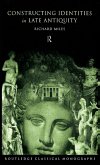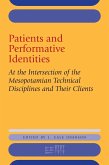Identities in Antiquity
Herausgeber: Tsouparopoulou, Christina; Manolopoulou, Vicky; Skinner, Joseph
Identities in Antiquity
Herausgeber: Tsouparopoulou, Christina; Manolopoulou, Vicky; Skinner, Joseph
- Gebundenes Buch
- Merkliste
- Auf die Merkliste
- Bewerten Bewerten
- Teilen
- Produkt teilen
- Produkterinnerung
- Produkterinnerung
Identities in Antiquity is multi-disciplinary platform for the synthetic study of ancient identities, set in a more rounded and inclusive notion of Antiquity, spanning the ancient Mediterranean world and beyond from the third millennium BCE until the early Middle Ages.
Andere Kunden interessierten sich auch für
![Constructing Identities in Late Antiquity Constructing Identities in Late Antiquity]() Constructing Identities in Late Antiquity197,99 €
Constructing Identities in Late Antiquity197,99 €![Patients and Performative Identities Patients and Performative Identities]() Patients and Performative Identities140,99 €
Patients and Performative Identities140,99 €![Moral Values in the Ancient World Moral Values in the Ancient World]() John FergusonMoral Values in the Ancient World197,99 €
John FergusonMoral Values in the Ancient World197,99 €![Roman Imperialism and Local Identities Roman Imperialism and Local Identities]() Louise RevellRoman Imperialism and Local Identities51,99 €
Louise RevellRoman Imperialism and Local Identities51,99 €![Nineveh and Its Palaces Nineveh and Its Palaces]() Joseph BonomiNineveh and Its Palaces43,99 €
Joseph BonomiNineveh and Its Palaces43,99 €![Influence of the Phallic Idea in the Religions of Antiquity Influence of the Phallic Idea in the Religions of Antiquity]() C. Staniland WakeInfluence of the Phallic Idea in the Religions of Antiquity33,99 €
C. Staniland WakeInfluence of the Phallic Idea in the Religions of Antiquity33,99 €![Holiness Holiness]() Hannah K HarringtonHoliness186,99 €
Hannah K HarringtonHoliness186,99 €-
-
-
Identities in Antiquity is multi-disciplinary platform for the synthetic study of ancient identities, set in a more rounded and inclusive notion of Antiquity, spanning the ancient Mediterranean world and beyond from the third millennium BCE until the early Middle Ages.
Hinweis: Dieser Artikel kann nur an eine deutsche Lieferadresse ausgeliefert werden.
Hinweis: Dieser Artikel kann nur an eine deutsche Lieferadresse ausgeliefert werden.
Produktdetails
- Produktdetails
- Verlag: Taylor & Francis Ltd
- Seitenzahl: 632
- Erscheinungstermin: 4. April 2025
- Englisch
- Abmessung: 246mm x 174mm
- Gewicht: 453g
- ISBN-13: 9781138545168
- ISBN-10: 1138545163
- Artikelnr.: 71552591
- Herstellerkennzeichnung
- Libri GmbH
- Europaallee 1
- 36244 Bad Hersfeld
- gpsr@libri.de
- Verlag: Taylor & Francis Ltd
- Seitenzahl: 632
- Erscheinungstermin: 4. April 2025
- Englisch
- Abmessung: 246mm x 174mm
- Gewicht: 453g
- ISBN-13: 9781138545168
- ISBN-10: 1138545163
- Artikelnr.: 71552591
- Herstellerkennzeichnung
- Libri GmbH
- Europaallee 1
- 36244 Bad Hersfeld
- gpsr@libri.de
Joseph Skinner is Senior Lecturer in Ancient Greek History at Newcastle University. His publications include The Invention of Greek Ethnography: From Homer to Herodotus (New York, 2012), and (as co-editor) Ancient Ethnography: New Approaches (London, 2013) and Herodotus and the Long Nineteenth Century (Cambridge, 2020). Vicky Manolopoulou is Research fellow in Environmental History at Ca'Foscari University, Venice. Her work centres on the intersection of landscape studies, environmental humanities and the history of emotions, focusing on the Eastern Mediterranean during the first millennium. Key research interests include human environment interactions, emotions, ritual and mnemonic landscapes. Christina Tsouparopoulou is Assistant Professor in Near Eastern Archaeology and History at the Cardinal Stefan Wyszynski University in Warsaw and an Honorary Research Fellow at Durham University. Her work bridges the material, visual, and textual culture of the ancient Near East and Eastern Mediterranean.
Introduction (J. Skinner, V. Manolopoulou, and C.Tsouparopoulou); Part I
Approaching Ancient Identities; 1. Challenging essentialism: disentangling
ancient and modern notions of ethnicity (J. Siapkas); 2. Elite Identities:
Greece and Egypt in comparative perspective (M. Haysom); 3. The identities
of enslaved persons (K. Vlassopoulos); 4. Personal names and Identity: A
socio-onomastic approach to naming practices in the ancient world (A.
Gavrielatos); 5. Religious identities in ancient cities (J. Rüpke); 6. Open
dynamic custodianship: alternatives to understanding diversity and
transformation (E. Isayev); 7. Construction of Gender Identities in
Mesopotamia (S. Svärd & A. Garcia-Ventura); 8. Mercantile and Religious
identities in Anatolia in the Middle Bronze Age (Y. Heffron & N. Highcock);
9. The identity of enslaved persons in ancient Mesopotamia (N. Reid); 10.
Exilic Communities in Babylonia (L. Pearce); 11. Ancient Judaism: Ethnicity
or Religion (E. Gruen); Part III The Mediterranean world until the age of
the Successors; 12. A community of practice perspective on craft production
and culture change in the Bronze Age Cyclades (N.Abell); 13. The resilience
of a "non-people": The case for a reconstructed Phoenician identity (C.
López-Ruiz); 14. Transcultural Tokens of Identity: The Mechanics of
Crossing Borders in the Ancient Mediterranean (D. Demetriou); 15. Classical
Greek racism (T. Harrison); 16. Race and the Athenian Metic (R.
Futo-Kennedy); 17. Greek Local Identity and Greek Local History (D. Tober);
Part IV The Roman World: From Early Republic to late empire; 18. Roman
Aristocratic Family Identity in the Late Republic and Early Empire (G.
Farney); 19. Identities of Enslaved Persons in the Roman World (C. Bruun);
20. Identity construction in Alexandria: Greeks, Jews and Romans (K.
Czajkowski); 21. Roman Military Identities (A. Gardner); Part V From Late
antiquity until the early middle ages, and beyond: Rome, Byzantium and
others; 22. Peripheral Identities: ethnicity, Anglo-Saxons and the
Stützarmfibeln (J. Gerrard); 23. Goths, Huns and Vandals: the identity of
the Huns. (H. J. Kim); 24. Sacrifice, Banquets, and Drunken Elephants: The
Problem of Christian Identity in Libanius's Oratio 30. (R. Falcasantos);
25. The Open Secret of Byzantine Nationalism. (A. Kaldellis); 26.
Demarcating Rome: on the papal strategy of Othering and the re-invention of
Greeks. (C. Gantner); 27. The Case of Manuel I Komnenos: Articulating
Identity through Gender, Sexuality, and Racialisation (R. Betancourt).
Approaching Ancient Identities; 1. Challenging essentialism: disentangling
ancient and modern notions of ethnicity (J. Siapkas); 2. Elite Identities:
Greece and Egypt in comparative perspective (M. Haysom); 3. The identities
of enslaved persons (K. Vlassopoulos); 4. Personal names and Identity: A
socio-onomastic approach to naming practices in the ancient world (A.
Gavrielatos); 5. Religious identities in ancient cities (J. Rüpke); 6. Open
dynamic custodianship: alternatives to understanding diversity and
transformation (E. Isayev); 7. Construction of Gender Identities in
Mesopotamia (S. Svärd & A. Garcia-Ventura); 8. Mercantile and Religious
identities in Anatolia in the Middle Bronze Age (Y. Heffron & N. Highcock);
9. The identity of enslaved persons in ancient Mesopotamia (N. Reid); 10.
Exilic Communities in Babylonia (L. Pearce); 11. Ancient Judaism: Ethnicity
or Religion (E. Gruen); Part III The Mediterranean world until the age of
the Successors; 12. A community of practice perspective on craft production
and culture change in the Bronze Age Cyclades (N.Abell); 13. The resilience
of a "non-people": The case for a reconstructed Phoenician identity (C.
López-Ruiz); 14. Transcultural Tokens of Identity: The Mechanics of
Crossing Borders in the Ancient Mediterranean (D. Demetriou); 15. Classical
Greek racism (T. Harrison); 16. Race and the Athenian Metic (R.
Futo-Kennedy); 17. Greek Local Identity and Greek Local History (D. Tober);
Part IV The Roman World: From Early Republic to late empire; 18. Roman
Aristocratic Family Identity in the Late Republic and Early Empire (G.
Farney); 19. Identities of Enslaved Persons in the Roman World (C. Bruun);
20. Identity construction in Alexandria: Greeks, Jews and Romans (K.
Czajkowski); 21. Roman Military Identities (A. Gardner); Part V From Late
antiquity until the early middle ages, and beyond: Rome, Byzantium and
others; 22. Peripheral Identities: ethnicity, Anglo-Saxons and the
Stützarmfibeln (J. Gerrard); 23. Goths, Huns and Vandals: the identity of
the Huns. (H. J. Kim); 24. Sacrifice, Banquets, and Drunken Elephants: The
Problem of Christian Identity in Libanius's Oratio 30. (R. Falcasantos);
25. The Open Secret of Byzantine Nationalism. (A. Kaldellis); 26.
Demarcating Rome: on the papal strategy of Othering and the re-invention of
Greeks. (C. Gantner); 27. The Case of Manuel I Komnenos: Articulating
Identity through Gender, Sexuality, and Racialisation (R. Betancourt).
Introduction (J. Skinner, V. Manolopoulou, and C.Tsouparopoulou); Part I
Approaching Ancient Identities; 1. Challenging essentialism: disentangling
ancient and modern notions of ethnicity (J. Siapkas); 2. Elite Identities:
Greece and Egypt in comparative perspective (M. Haysom); 3. The identities
of enslaved persons (K. Vlassopoulos); 4. Personal names and Identity: A
socio-onomastic approach to naming practices in the ancient world (A.
Gavrielatos); 5. Religious identities in ancient cities (J. Rüpke); 6. Open
dynamic custodianship: alternatives to understanding diversity and
transformation (E. Isayev); 7. Construction of Gender Identities in
Mesopotamia (S. Svärd & A. Garcia-Ventura); 8. Mercantile and Religious
identities in Anatolia in the Middle Bronze Age (Y. Heffron & N. Highcock);
9. The identity of enslaved persons in ancient Mesopotamia (N. Reid); 10.
Exilic Communities in Babylonia (L. Pearce); 11. Ancient Judaism: Ethnicity
or Religion (E. Gruen); Part III The Mediterranean world until the age of
the Successors; 12. A community of practice perspective on craft production
and culture change in the Bronze Age Cyclades (N.Abell); 13. The resilience
of a "non-people": The case for a reconstructed Phoenician identity (C.
López-Ruiz); 14. Transcultural Tokens of Identity: The Mechanics of
Crossing Borders in the Ancient Mediterranean (D. Demetriou); 15. Classical
Greek racism (T. Harrison); 16. Race and the Athenian Metic (R.
Futo-Kennedy); 17. Greek Local Identity and Greek Local History (D. Tober);
Part IV The Roman World: From Early Republic to late empire; 18. Roman
Aristocratic Family Identity in the Late Republic and Early Empire (G.
Farney); 19. Identities of Enslaved Persons in the Roman World (C. Bruun);
20. Identity construction in Alexandria: Greeks, Jews and Romans (K.
Czajkowski); 21. Roman Military Identities (A. Gardner); Part V From Late
antiquity until the early middle ages, and beyond: Rome, Byzantium and
others; 22. Peripheral Identities: ethnicity, Anglo-Saxons and the
Stützarmfibeln (J. Gerrard); 23. Goths, Huns and Vandals: the identity of
the Huns. (H. J. Kim); 24. Sacrifice, Banquets, and Drunken Elephants: The
Problem of Christian Identity in Libanius's Oratio 30. (R. Falcasantos);
25. The Open Secret of Byzantine Nationalism. (A. Kaldellis); 26.
Demarcating Rome: on the papal strategy of Othering and the re-invention of
Greeks. (C. Gantner); 27. The Case of Manuel I Komnenos: Articulating
Identity through Gender, Sexuality, and Racialisation (R. Betancourt).
Approaching Ancient Identities; 1. Challenging essentialism: disentangling
ancient and modern notions of ethnicity (J. Siapkas); 2. Elite Identities:
Greece and Egypt in comparative perspective (M. Haysom); 3. The identities
of enslaved persons (K. Vlassopoulos); 4. Personal names and Identity: A
socio-onomastic approach to naming practices in the ancient world (A.
Gavrielatos); 5. Religious identities in ancient cities (J. Rüpke); 6. Open
dynamic custodianship: alternatives to understanding diversity and
transformation (E. Isayev); 7. Construction of Gender Identities in
Mesopotamia (S. Svärd & A. Garcia-Ventura); 8. Mercantile and Religious
identities in Anatolia in the Middle Bronze Age (Y. Heffron & N. Highcock);
9. The identity of enslaved persons in ancient Mesopotamia (N. Reid); 10.
Exilic Communities in Babylonia (L. Pearce); 11. Ancient Judaism: Ethnicity
or Religion (E. Gruen); Part III The Mediterranean world until the age of
the Successors; 12. A community of practice perspective on craft production
and culture change in the Bronze Age Cyclades (N.Abell); 13. The resilience
of a "non-people": The case for a reconstructed Phoenician identity (C.
López-Ruiz); 14. Transcultural Tokens of Identity: The Mechanics of
Crossing Borders in the Ancient Mediterranean (D. Demetriou); 15. Classical
Greek racism (T. Harrison); 16. Race and the Athenian Metic (R.
Futo-Kennedy); 17. Greek Local Identity and Greek Local History (D. Tober);
Part IV The Roman World: From Early Republic to late empire; 18. Roman
Aristocratic Family Identity in the Late Republic and Early Empire (G.
Farney); 19. Identities of Enslaved Persons in the Roman World (C. Bruun);
20. Identity construction in Alexandria: Greeks, Jews and Romans (K.
Czajkowski); 21. Roman Military Identities (A. Gardner); Part V From Late
antiquity until the early middle ages, and beyond: Rome, Byzantium and
others; 22. Peripheral Identities: ethnicity, Anglo-Saxons and the
Stützarmfibeln (J. Gerrard); 23. Goths, Huns and Vandals: the identity of
the Huns. (H. J. Kim); 24. Sacrifice, Banquets, and Drunken Elephants: The
Problem of Christian Identity in Libanius's Oratio 30. (R. Falcasantos);
25. The Open Secret of Byzantine Nationalism. (A. Kaldellis); 26.
Demarcating Rome: on the papal strategy of Othering and the re-invention of
Greeks. (C. Gantner); 27. The Case of Manuel I Komnenos: Articulating
Identity through Gender, Sexuality, and Racialisation (R. Betancourt).








